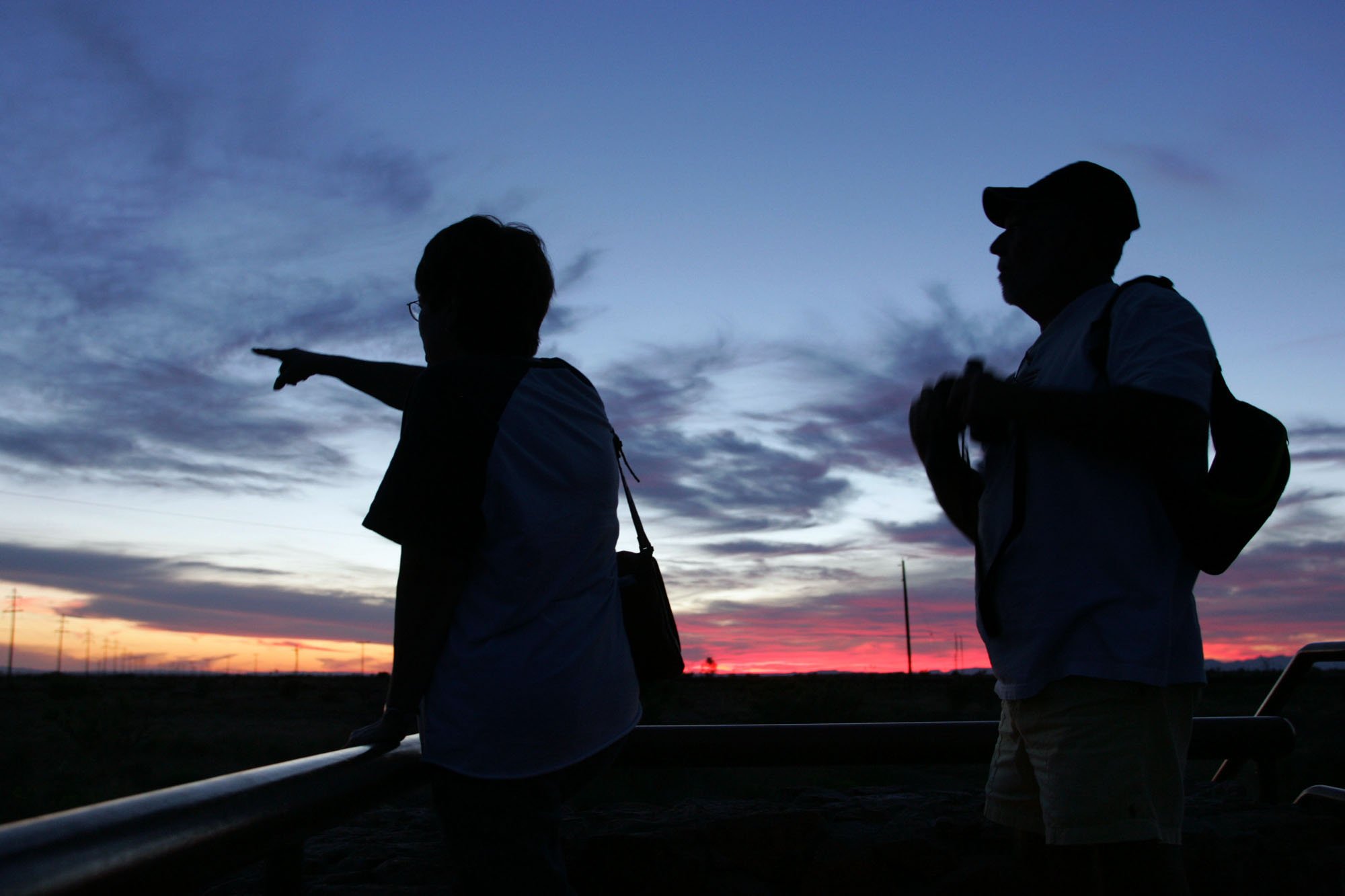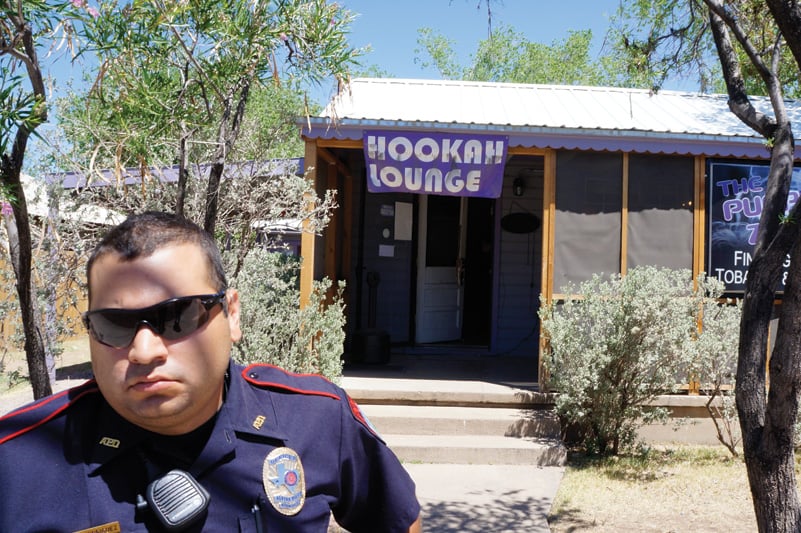
The Thin Purple Line
After a controversial raid on a West Texas smoke shop, nothing is hazier than the truth.

A version of this story ran in the August 2014 issue.
Until recently, you could expect that Texas’ Big Bend region, in its vastness, afforded you a good chance of being left alone. Old-timers there have a reputation for a strong independent streak, even among Texans, and the region seems to attract people grateful, at last, to live life on their own terms. But many have arrived in the past few years expecting a scenic spot to retire in arid mountain peace only to find the federal government moving in too. The Big Bend has become a front line in the national war on drugs, and many of the officers from various federal law enforcement agencies have settled in Alpine, an old railroad town cupped in a valley horseshoed by foothills of the Davis Mountains.
Ilana Lipsen came to Alpine to study horses. Her family never thought she’d last long out here. Lipsen grew up in the wealthy Houston enclave of Bellaire, where she attended a private Jewish school and spent her Saturdays looking forward to Sunday, which she spent riding and looking after her Arabian horses. She came to Sul Ross State University to study equine science in 2003, making the long drive west with her Arabians in tow. Her best high school friend moved with her, and one evening shortly after arriving they clambered up a brown ridge with a crumbled white “A” branded on the side, a local landmark known as A Mountain. The lights of town glowed below them, with the surrounding desert darkness stretching on forever and a sea of stars above. In the wide open space, Lipsen felt at home.
On a Friday in mid-May, Lipsen found herself contemplating one of the Big Bend’s less dramatic views: the interior walls of the Presidio County Jail, and her own yellow jumpsuit, which she’d spent three days in. Outside, the press was buzzing about the raid on Lipsen’s store, a hookah lounge and smoke shop called the Purple Zone. A task force of at least a dozen federal agents and local police—some said as many as 30—broke down her front door hunting for synthetic drugs. Shouldering rifles and wearing bulletproof vests, they hauled off the store’s merchandise and loaded it into a line of unmarked trucks along Holland Avenue, one of the busiest streets in town. Rumors flew about the altercation during the raid between Lipsen’s sister and an agent with the Drug Enforcement Administration (DEA), each of whom claimed they’d been assaulted by the other. Some Alpine residents wondered how Lipsen could have so royally pissed off the local district attorney that she got her shop raided four times in two years. Now she sat in jail facing a federal weapons charge for possessing 9 mm bullets that are, in most cases, legal.
Sitting in county jail, Lipsen was convinced the town was simply trying to chase her out—because some locals didn’t approve of her business, or because she was Jewish, or even because of her Arabian horses—and she told local reporters as much. In a town full of libertarians who’d grown wary of the police presence near the border, Lipsen’s cause struck a chord. The allegations of a ham-handed raid by federal agents riled crusty libertarians who might otherwise have been glad to see Lipsen pack up her shop and leave town. The federal officials who helped carry out the raid weren’t pleased.
So that Friday afternoon, Lipsen’s public defender visited to convey an unusual proposal from the U.S. attorney, the terms of which were detailed in the court record: If she recanted her complaints about the federal agents, admitted that her sister had assaulted the DEA agent, and asked a local blogger to delete photos from the raid he’d posted online, Lipsen could get out of jail. If not, she’d face months in jail until her trial. Her lawyer produced a typed apology with Lipsen’s name at the bottom and a blank line. Lipsen signed.
Officials trumpeted her apology in the press and on Facebook. They claimed it was proof that Lipsen had lied, that there was nothing to see here. But news of Lipsen’s letter had the opposite effect, drawing national attention from First Amendment scholars, libertarian press, and even the actor Wil Wheaton, best known as the starship Enterprise’s ensign. As with so much else where the Purple Zone was concerned, the truth depended on whose side you took. Lipsen hadn’t exactly been a popular figure in town. But in Alpine, where many had tired of the DEA, Immigration and Customs Enforcement, Border Patrol, state troopers, city police and university cops, there was plenty of support for someone who dared to speak out. By trying to undermine Lipsen, the feds may have created a martyr.
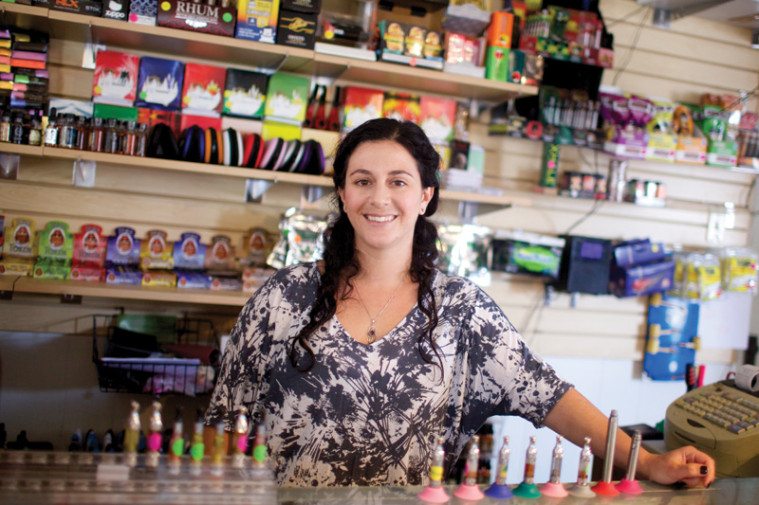
On a Thursday morning in June, Lipsen meets me at the Purple Zone’s new front door. (The old one, busted up in the raid, still sits in the front lawn.) She’s been up since early this morning watching the latest episodes of Orange is the New Black. Lipsen shows me to one of the tables in her small smoking lounge, then takes a Red Bull from a small fridge by the door, drops into a chair across from me and produces an electronic cigarette, which she twiddles as she talks. Though Lipsen won’t talk about her legal issues, she’s agreed to discuss her shop and her time in Alpine. She speaks fast, joking about how unprepared this town was for her shop or its owner.
Like towns all over Texas, Alpine is enjoying a vaping fascination in 2014; I count at least two other shops in town advertising e-cigarettes. When I ask, she tells me the black stick in her hand is a Chinese-made Innokin e-cigarette loaded with a fruity flavor called “Headhunter’s Revenge.” A flat screen behind her lists the dozens of other e-juice flavors she sells. “I have love for this industry,” she tells me. “People know that smoking is a thing of the past. It’s just not cool anymore. Go back to the 1920s, go back to Prohibition, you weren’t cool unless you had a Lucky Strike hanging from your lips. Now it’s the same with electronic cigarettes.”
A box of Bob Marley posters sits on the floor, across from a selection of psychedelic wall hangings. In another corner she’s got lotions and oils. Shelves lining the walls are full of cigarettes, hookahs and water pipes—a sign by the register makes it plain that in this shop, you had better call them water pipes.
Lipsen hadn’t even planned to sell this stuff in the first place. After a Sul Ross equine science instructor left the program, Lipsen decided to quit school. But having fallen in love with the town, she decided to stay in Alpine. She had been working at a Mexican import shop called Texas Treasures, selling home décor and furniture she brought in from Laredo. She basically ran the place herself for an absentee owner, she says. Lipsen eventually bought him out, but took on a hefty debt in the transaction—more than she’d agreed to, she says—and needed a quick way to boost her bottom line.
“I started thinking, ‘Ilana, use your head. What can you do to attract new business?’” she recalls. “I love animals obviously, so I thought, ‘Let’s do pet supplies.’ A couple years later, True Value opens up.” She couldn’t compete; her pet supply business went flat. She tried selling saddles and tack for other horse enthusiasts, but nobody was interested.
“So it was back to the drawing board. ‘What do people in Alpine want to buy? What do people do?’” In the retelling of her internal dialogue, Lipsen pauses here for dramatic effect. “‘Well shit, everyone loves sex toys, let’s do that.’ Sex toys take off with a boom. ‘Well shit, people in Alpine love smoking accessories, let’s do that.’ So a smoke shop with sex toys, that worked. … So here we are.”
It took less than a week for the first church lady to come huffing into Texas Treasures, breezing past the wrought-iron bed frames and back to the walled-off adult section, which she paced briefly before marching back out the door with the parting words, “This is fucked up!”
An Alpine PD inventory of the raid lists products including “Dr. Feelgood Original,” “Orgazmo Vanilla,” “Bomb! Marley,” “OMG,” “Scooby Snax Kush” and “Captain Kratom Gold.”
Along with her pipes, papers and hookahs, Lipsen began cashing in on other trends. Lipsen traveled to trade shows, kept up with catalogs, and began stocking her shop with new entrants to the market, like kratom, a legal stimulant with effects similar to coffee. According to records from police raids, Lipsen also sold packets of herbal “incense” sprayed with chemicals engineered to simulate pot—legal just a few years ago by virtue of complete lack of regulation, but now, depending on the chemical makeup, often just as illegal as meth or cocaine.
Lipsen found a new location a few minutes’ walk from the Sul Ross campus. She liquidated the Mexican imports and began mixing her own hookah cocktails bestowed with locally appropriate names like “The Lobo”—for the Sul Ross mascot—and the “Marfa-Light-It-Up.” She brought in tables and chairs, board games and free Wi-Fi. Students came in to study or smoke a hookah between classes, and on Thursday and Friday nights they filled the small house. Lipsen dropped the Texas Treasures name and christened her new shop after a room in her childhood home, a place with a dartboard, a purple-felted billiard table and purple walls, where she and her friends hung out. “It was always like kind of a joke, like, ‘Hey, let’s hang out in the purple zone,’” she remembers. “That’s the way I felt here. It was comfortable like in my old game room growing up.”
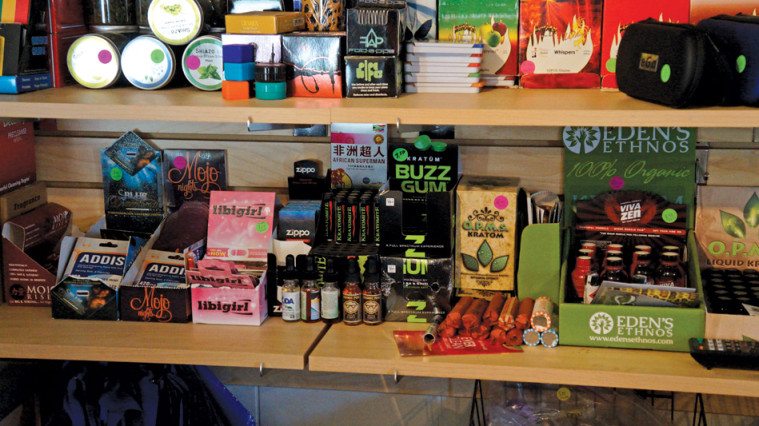
Julie Vega knew what it looked like when one of her English students would show up high: the quiet reserve, the pained attempt at nonchalance. It happened once a month or so during her classes at Sul Ross. But in fall 2009 it was different. Some days she’d get one in every class, jittery and amped-up, constantly messing with their hands. When Vega would confront them after class, they didn’t mind telling her they’d just been smoking spice—one common name for the synthetic pot that was just becoming popular—nor that they’d bought it at the Purple Zone. “I think because it was such a new drug to Alpine, and the fact that it was legal, everybody was smoking it,” Vega says. “That was their argument: ‘Ms. Vega, who cares? It’s legal.’”
One day in spring 2010, a student fell out of his desk in a seizure mid-class. Later he told Vega he’d been high on salvia divinorum—a plant that can cause hallucinations, but remains legal in many states—from Lipsen’s shop. Vega had once wandered into the Purple Zone a year earlier by mistake; since purple and gold are the Alpine High School colors, she thought it was a school T-shirt shop. Now Vega planned a protest outside the store, and invited her students to join in; for extra credit, they could either join her demonstration against the Purple Zone’s synthetic drug sales, or they could join a counter-protest supporting Lipsen’s right to sell things like spice and salvia, which were still legal at the time. Vega held the protest on April 20—doing it on 4/20 was her students’ idea—and her side was dwarfed by a crowd across the street supporting the Purple Zone.
Vega followed her protest with more agitation at the City Council, and others joined her, hoping to shut Lipsen down or ban the synthetic drugs. Parents came into the store to confront Lipsen—one even shoved her against the wall, Lipsen says—because they said their kids had been caught with synthetic drugs she had sold them. Lipsen says she uses an ID scanner to ensure nobody in the store is under 18. But according to one Alpine police officer’s affidavit in 2012, an underage informant reported buying synthetic pot called K2 at the Purple Zone. Around the same time, a man staying at a motel in town ended up in the hospital with an irregular heartbeat after smoking spice he said he bought from the store.
In March 2012, officers from the Alpine Police Department and the Brewster County Sheriff’s Office poured into the Purple Zone. They came ready with a warrant, picked up 60 of Lipsen’s products, and left. Then, for eight months, nothing happened. Lipsen wondered what the trouble had been all about until November 2012, when officers came back to raid her shop again. They picked up more foil packets, along with other products that apparently seemed suspicious, including roasted hemp seed snacks and hemp lotion. An Alpine PD inventory of the raid lists products including “Dr. Feelgood Original,” “Orgazmo Vanilla,” “Bomb! Marley,” “OMG,” “Scooby Snax Kush” and “Captain Kratom Gold.”
This time they arrested Lipsen, along with her mother, Rosa, who’d moved to Alpine in 2007. Rosa Lipsen’s name doesn’t appear on any of the Purple Zone’s business filings, nor do court records suggest she’d sold contraband to any informants, but she was apparently implicated by family relation. A grand jury indicted each of them on three charges of possession of illegal drugs with intent to distribute.
One morning in February 2013—a day Lipsen says she was scheduled for a bond hearing—police called Rosa Lipsen to tell her that the Purple Zone had been robbed. Ilana went to the store to find spice packets on the floor, and while she was cleaning up the mess an officer arrived with a search warrant, arrested her again and took packets of “Diablo,” “King Kong” and “Dr. Feelgood Original” for the evidence room.
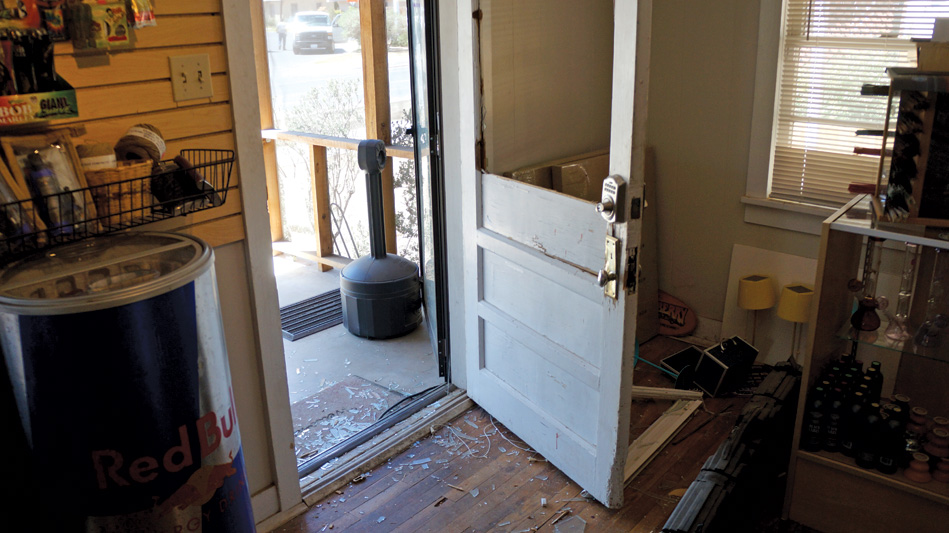
Nobody knows how much of what the police took from the Purple Zone—in three visits over less than a year—was illegal to sell. Court records suggest a small fraction of what they took has been tested, probably because the testing is so expensive. Lipsen says it costs her $1,000 a test to send new products to a lab for an independent analysis to ensure she’s not selling anything with illegal chemicals. In a marijuana or cocaine case, the district attorney could usually send samples to a Texas Department of Public Safety (DPS) crime lab to be analyzed for free. But as of this spring, DPS labs apparently wouldn’t test for the illegal chemicals in spice. At a March 2014 meeting of the Brewster County commissioners, District Attorney Rod Ponton arrived, hat in hand, asking for $6,000 to cover testing he’d already commissioned months earlier. “My office does not have the budget to pay this bill,” he told them. Commissioners denied his request.
Court records show that Ponton got 73 samples analyzed by a suburban Fort Worth lab. Thirty-one of the tests have returned results, with 14 of those testing positive for chemicals similar to those on the state’s list of banned substances. The legal term is that they’re “chemical analogs” to something illegal, which prosecutors say is close enough to the real thing to make distribution a first-degree felony.
“I don’t see this as a civil liberties problem. I see it as a public health issue.”
I asked Lipsen for her reaction to hearing that some of her products had tested positive for spice, knowing she might avoid answering something so close to her case. She replied with a non-answer that also neatly captures the legal fight she faces: “Well, what is spice? You know?”
When I drop by DA Ponton’s office on a Friday afternoon, he sounds much more certain. “That stuff fries your brain,” he explains. Ponton was raised in Alpine, a doctor’s son who finished law school at Texas Tech University and returned to practice around the Big Bend. In 2012, he narrowly won a runoff election for DA after reports surfaced that he had a DWI on his record from 1977. His legal history remains the object of local fascination, particularly among those who see a conspiracy behind his dogged pursuit of Lipsen’s shop. Ponton wouldn’t discuss the Purple Zone case, but he agreed to speak generally about his work to curb spice sales, which he says began after locals were hospitalized after using the drugs. In the last few years, he says, his assistant district attorney has become one of the state’s few synthetic cannabinoid experts. “Synthetic drugs have been sold as if they’re harmless, and they’re not,” he tells me. “I don’t see this as a civil liberties problem. I see it as a public health issue.”
His absolute certainty also shows in the court record of the cases against Lipsen and her mother. In a motion from spring 2013, Ponton describes an investigator’s offer to leave Lipsen alone if she’ll stop selling spice as an “extraordinary act of mercy.” Ponton and his assistant DA express shock at Lipsen’s persistence, her “singular incorrigibility,” and her “shocking arrogance about the entire process” despite the officer’s offer “to let criminal bygones be bygones if only she would stop poisoning our children.”
But Lipsen’s lawyer has made what seems like a pretty compelling argument: that the chemicals found in the Purple Zone samples were only added to Texas’ banned substances list in mid-2013—well after they were seized at Lipsen’s shop. To convict Lipsen, Ponton’s office might have needed yet another raid on the Purple Zone, and yet more testing he evidently couldn’t pay for—unless he could find some other agency to foot the bill.
My first night in Alpine, I meet Bryon Garrison, an Austin-born and Midwest-raised journalist who runs the online Big Bend Courier, which he recently founded along with a county fair and a community theater program. On Friday nights this summer, they put on a Wild West-themed dinner show for tourists. “People come out here looking for cowboys,” he tells me, “so we give ’em cowboys!”
Strolling along Holland Avenue downtown, under its sagging awnings, past art galleries and thrift shops and the town’s only movie theater, Garrison points out notable locals and recounts small-town stories. Garrison says he left Illinois in 2013 and moved to Alpine without ever having seen it. I ask if he likes the town. “I’m gonna die here,” he replies enthusiastically. Garrison is in his mid-30s, but the sentiment seems common among committed Big Bend transplants.
Garrison and other locals I spoke with say the atmosphere has changed in Alpine over the past five years. Alpine may be in the middle of nowhere, but it’s also 75 miles from the Texas-Mexico border. As state and federal agencies expand their lumbering attempts to secure the border—along with their definitions of “secure”—this old libertarian town is feeling more and more like a police state. Along the country’s southwestern edge, the U.S. Border Patrol alone has grown from 8,580 agents in 2000 to 18,611 in 2013. In Big Bend it expanded from 196 agents to 623 in that time. Marfa is home to one of the Texas Rangers’ Joint Operations and Intelligence Centers, hubs where state, local and federal officers coordinate anti-smuggling efforts and hope to prevent “spillover” violence from Mexico. In practice, that often means stopping drivers along the highways between towns and patrolling private ranchland near and along the border. This year, in response to the influx of refugees from Central America, state and federal officials are planning even greater deployments.
Tom Curry, an artist in Alpine who moved here in 1993, says he hears the complaints most from tourists who’ve been stopped on the highway that links Alpine to Marfa—some even avoid visiting now because they’ve been hassled so often by state troopers. “When I first moved here, I didn’t remember that being an issue at all,” he says. “It’s not a high crime area. It just seems kind of weird for there to be so much law enforcement.”
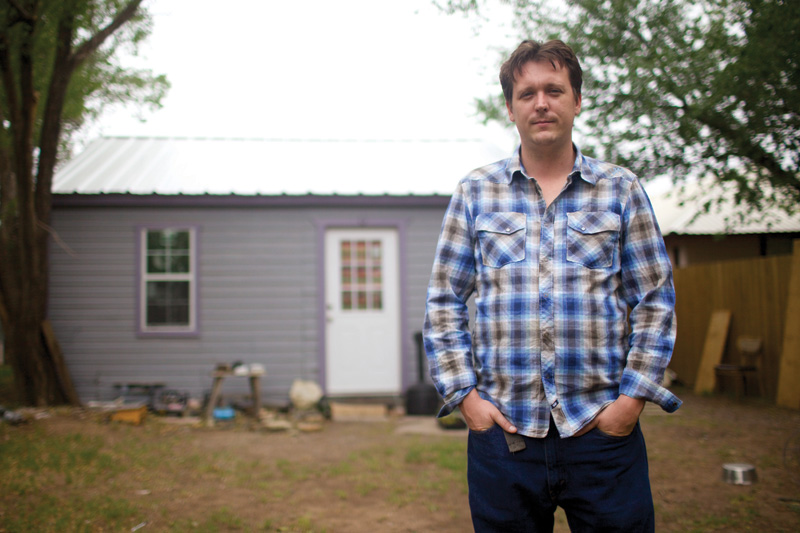
On May 7, the DEA announced it had conducted a massive one-day operation, raiding around 200 targets across the country under what it called Project Synergy Phase II. It claimed more than 150 arrests and “hundreds of thousands of individually packaged, ready-to-sell synthetic drugs” netted in 29 states. It was a massive drugs-on-the-table operation meant partly as a public-relations stunt to show just how many illegal drugs are being sold over the counter.
When Nicholas Branson came home from an errand that morning, he stepped right in the middle of Project Synergy Phase II. The 30-year-old Sul Ross geology student lived in a detached garage apartment rented from Lipsen, just behind her shop. Branson was a little frayed already—he’d been up all night studying for a final exam—and another raid on the Purple Zone wasn’t enough to keep him from his bed. But he noticed the gate to his yard was open, then saw agents from the DEA’s multi-agency task force coming out his front door. He explained that his house had a different address from the Purple Zone—his was 705 1/2 East Holland Ave.—and asked to see a warrant to search his place, which they didn’t have. After Branson insisted it was his right not to have his home searched without a warrant, he recalls, one DEA agent fingered the trigger of his gun and rebutted: “What are you, a fucking lawyer?”
DEA spokesperson Laila Rico told the Observer that it’s standard for agents to secure all the buildings on a property during a raid, simply to prevent an ambush. Once they recognized Branson’s place as an apartment and not a Purple Zone storage unit, Rico says, the agents quit searching until DA Ponton could get a warrant for it too, which he did shortly before noon.
Walking back toward the street, Branson found Lipsen’s sister, Arielle, losing patience. She’d been the one who’d arrived at the shop in the morning to find the task force—a dozen or more from DEA, Customs and Border Protection, Alpine PD and Brewster County Sheriff’s Office—trying to get into the shop. While she spoke with the agents—Rico says Arielle was only stalling—agents broke through the door with a metal battering ram. Arielle called Ilana, who came to watch along with their mother. After hours of watching the agents haul merchandise, computer equipment and record books into trucks, Arielle got into a shouting match with a DEA agent, who asked her to leave the Purple Zone’s front yard. As Branson recalls she replied, “What are you gonna do, shoot me?”
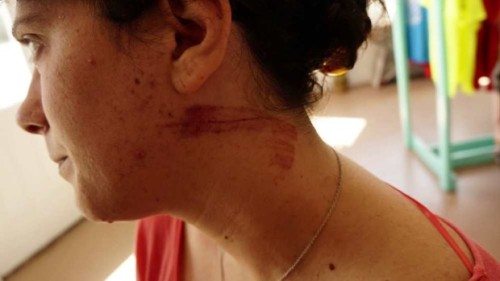
Branson says he was in the front yard to see what happened next: The agent grabbed Arielle by the shoulder, guided her to the yard next door, and pushed her to the ground. Arielle’s leg flew up as she fell, hit the agent’s leg, Branson says, and the agent retaliated by pinning her throat to the ground with the butt of his rifle. Ilana Lipsen told local reporters the same story shortly after the raid. No video has surfaced of the incident, but Rico, the DEA spokesperson, can explain. “What I can say is that’s a complete lie,” she says. A photo taken later shows a long red rectangle-shaped bruise on the left side of Arielle’s neck, with two shorter ones below it. Rico doesn’t believe that’s what the butt of a gun would do. “It looks like a scratch to me,” she says, figuring Arielle got it while she was on the ground getting cuffed. But Rico says the most preposterous part of Lipsen and Branson’s story is that an agent threatened Branson by fingering the trigger of his gun, which she says goes against everything agents learn in training. “It’s like, ‘God almighty, you’ve been watching too much TV,’” Rico says. “There’s just no way, no way that anything like that happened.” The accusations are all neat deflections, Rico says, of the fact that Arielle repeatedly kicked a DEA agent, the offense for which she was arrested that afternoon.
Tom Cochran, a local gadfly who runs a screen-printing shop in Alpine, had been checking on a T-shirt order from the Purple Zone when he heard about the raid. He came by too late for the incident with Arielle, but in time to photograph agents in the front yard and the mess they left behind—and he posted the photos on Facebook.
As Branson recalls the state of his own place after the raid, he sounds a bit like Jeff “the Dude” Lebowski mourning his stolen rug—baffled but resigned to the peculiar injustice. He says agents destroyed a homemade beehive he kept outside, broke the doors on his grandmother’s bookcase, and emptied bags of rice and beans onto his kitchen floor. Branson says some of his computer storage drives were missing after the raid, and that they wound up on the evidence list for the Purple Zone. Branson isn’t facing any charges because of the raid, but he is concerned—the evidence list from his apartment shows two items: his grandfather’s shotgun and a bag of “suspected mushrooms.” Branson says he didn’t have mushrooms and guesses the reference is to a bag of frankincense missing from a drawer beside his bed, where he’d kept it along with his rocks of myrrh.
“It’s not a high crime area. It just seems kind of weird for there to be so much law enforcement.”
After the raid, but before learning about the weapons charge, Lipsen related her version of events to a local TV station and two newspapers. Now that Lipsen was stuck in jail, U.S. Attorney Jay Miller offered her the chance to get out—but only if she issued an apology for what she’d already told reporters. Her apology, according to court records, would have to admit that the “DEA had a legitimate reason” to search her shop and recant her suggestion that she’d been targeted “because she was Jewish, owned Arabian horses, is of Turkish decent [sic] or visited Chinese websites.” Lipsen would also have to claim her sister instigated the fight with the agent, and ask Cochran to “retract his blog on Facebook.”
On May 21, Garrison’s Big Bend Courier ran a story about the letter, which the actor Wil Wheaton shared on Tumblr later that day. First Amendment scholar and Washington Post blogger Eugene Volokh found the story from there and published a takedown calling Lipsen’s bond conditions “clearly unconstitutional.” “The legal system shouldn’t be able to pressure defendants to surrender their free speech rights this way,” Volokh wrote.
“The legal system shouldn’t be able to pressure defendants to surrender their free speech rights this way.”
The Big Bend chapter of the National Border Patrol Council—a union of Border Patrol agents—seems frustrated too. Though they’d never done business with Cochran before, they announced a boycott of his print shop. But Cochran, who’s even appeared on Fox Business Channel’s The Independents to tell his side of the story, has said the attention has all been good for business. He’s selling shirts in support of the Purple Zone, screened with a rallying cry for the people. The shirts say, “What are you gonna do, shoot me?”
Ilana and Rosa Lipsen are scheduled for a trial in late September on the lingering state charges from 2012, but according to court records, they’ve got till mid-July to accept a plea deal. If they don’t take the plea deals, Ponton’s office has already indicated its intention to pursue a higher bond for both of them, specifically because Lipsen is still running her shop.
Arielle and Ilana Lipsen are set for trials on their federal charges later this fall as well. And though Ilana Lipsen isn’t facing any drug charges based on the raid in May, agents collected more than 100 samples from the Purple Zone, which Rico says are still out at the lab. It’s possible that even more charges could be coming Lipsen’s way.
Lipsen is leaving the Purple Zone, at last, but says she’ll hire someone else to keep it open, pipes, oils, hookahs, kratom and all. She’s signed a lease for a new shop in Houston to focus on the e-cigarette business. Folks have been trying to run her out of town almost since she arrived, Lipsen says, and now they’ll finally get their wish. She may go to Houston or she may go to prison, but one way or another Lipsen is getting out of Alpine.
Correction: This story has been corrected from an earlier version to note purple and gold are Alpine High School’s colors, not Sul Ross State University’s, and to correct Branson’s account of the raid—that a DEA agent threatened him, not Arielle, with his gun.


